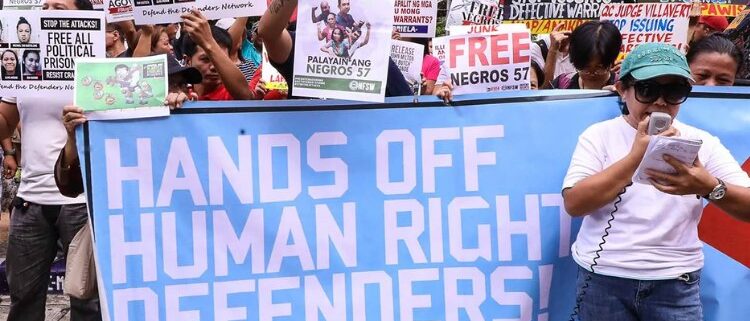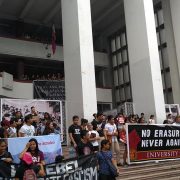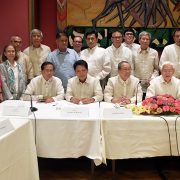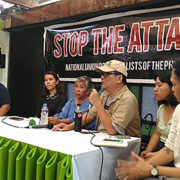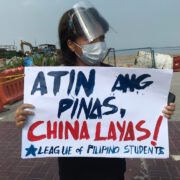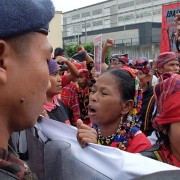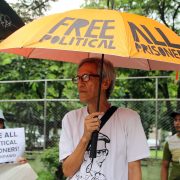BAYAN: More red-tagging, rights violations under BBM’s security program
Global groups condemn judicial harassments of rights defenders
The government’s National Security Program (NSP) has the problem of poverty and underdevelopment backwards, seeing it as product of armed conflict and not the other way around, Bagong Alyansang Makabayan (BAYAN) said.
BAYAN in a statement said there is nothing new in Ferdinand Marcos Jr.’s NSP for 2023 to 2028, adding the program does not frame the civil war in the country as a consequence of underdevelopment, exploitation and foreign domination in the country’s economy and politics.
“It looks at ‘peace’ only as a necessary condition for development but does not see peace as the result of social justice and genuine development,” BAYAN president Renato Reyes said.
Marcos Jr. last week issued Executive Order 37 (EO37) adopting NSP 2023-2028 that critics said is a continuation of security programs implemented under the Benigno Aquino and Rodrigo Duterte governments.
Reyes said the new NSP also simply reaffirmed the role of the National Task Force to End Local Communist Armed Conflict in counter-insurgency and praised its supposed achievements despite its bloody human rights record.
“This alone is telling as it signals the continuation of the government’s campaign of repression against the people and against all forms of dissent,” Reyes said.
The new NSP likewise pays lip-service to human rights and international humanitarian law, Reyes added, almost to a laughable extent because of the continuing human rights violations in the Philippines.
READ: BBM’s new security policy alarms farm workers
“Indeed, how can the Philippine government claim with a straight face that it deals with security threats ‘in strict observance of civil and human rights, and the international humanitarian law (IHL)’ when activists and revolutionaries are being abducted or executed and civilians are forced to ‘surrender’ as armed rebels?” Reyes asked.
The activist leader said the Marcos Jr. government appears oblivious to the local and international condemnation of red-tagging, doubling down on the policy by saying that “the Government shall strengthen its action against the legal fronts of the CPP-NPA-NDF (Communist Party of the Philippines-New People’s Army-National Democratic Front of the Philippines) to stop recruitment, cut financial sources, and debunk their propaganda.”
Dozens of European, North American and African countries have repeatedly called out the Philippine government on its dangerous practice of red-tagging, a policy alternately denied and confirmed by government officials in local and international forums such as the United Nations.
The NSP does not seek to achieve a just peace, a condition that is the result of genuine pro-people development and the full realization of human rights and democracy, BAYAN said.
Judicial harassment against rights defenders
Meanwhile, 42 global organizations expressed solidarity with 10 human rights defenders (HRDs) in the Philippines and condemned the filing of petitions to overturn their acquittal from charges of perjury last January 9.
In a statement, the organizations said both the original charge and the additional petition filed by former Armed Forces of the Philippines general and National Security Adviser Hermogenes Esperon Jr. is a reprisal for the defenders’ actions seeking legal protection from state harassment.
Acquitted were Karapatan National Council members Elisa Tita Lubi, Cristina Palabay, and Roneo Clamor; Gabriela leaders Joan May Salvador and Gertrudes Libang; as well as fellow rights defenders Gabriela Krista Dalena, Dr. Edita Burgos, Jose Mari Callueng, Fr. Wilfredo Ruazol, and Rural Missionaries of the Philippines coordinator Sr. Elenita Belardo.
The global organizations said the “weaponization” of the Anti-Terrorism Act (ATA) to suppress and persecute HRDs is alarming.
Karapatan has earlier reported that at least 13 defenders in the Southern Tagalog region currently face trumped-up criminal complaints, citing alleged violations under the ATA.
“Using the ATA to criminalise human rights workers adds to the long list of harassment orchestrated by the Philippine Government to delegitimise the work of HRDs and human rights organizations,” the global organizations said.
“Such aggressive crackdown on defenders not only violates their fundamental freedoms but also hinders their crucial work in protecting and promoting human rights for all,” they added.
Aside from judicial harassment, the organizations added that enduring red-tagging and other forms of harassment violate the Philippine government’s commitment in the Universal Periodic Review in 2022 to protect HRDs in the country. # (Raymund B. Villanueva)

